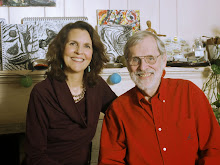 I hear it a lot in our memoir-writing groups. “This is better than therapy!”
I hear it a lot in our memoir-writing groups. “This is better than therapy!” Yes, it is. Which, to my mind, is not saying much. I think “therapy” is way overrated and I can't wait for it to be thrown on the historical pile of things-that-didn't-work.
But my response when people talk to me about the therapeutic wonders of writing real memoir is a response I got from Fred when I first brought it up with him many years ago when I was brand new to the Authentic Writing workshops. “Is this art, or is this therapy?” I asked him, suspiciously, looking, as always, for something to be wrong.
“Making art is therapeutic,” he answered calmly. Of course it is. How could it not be?
But a lot of people claim art therapy. They have theater groups and painting groups that claim to be therapeutic and I bet many of them help. But they are different from what we do in the Authentic Writing workshops and I want to see if I can distinguish how that is. I want to talk about the relationship between the type of writing that we do, its healing effects, and what art is. Because these are all big words and everyone uses them and means something a little different by them.
Take the word “memoir.” When people ask what type of writing I do and what type of writing the workshops focus on, that's the shortest answer: memoir. But I don't like that word much. I wish I could come up with something better because “memoir” covers all sorts of things that we are not.
At the extreme end of the scale there's memoir “as told to” -- you know, when the celebrity sits down with a writer, has a few long chats over drinks, etc., and the professional writer gets their story down on paper. That's called memoir. Let's get that off the table quickly. We all know this discussion isn't about that kind of memoir.
Then there's the broad swath of pedestrian memoirs in between the two extremes. And for the most part they are only boring because the people who write them aren't that interesting. You know, you can only write good memoir to the extent that you are plowed and irrigated as a person. If you haven't dared much, if you haven't looked inside much – no amount of “instruction” is going to make your writing – your expression of yourself – very complicated or unique. So the memoirs in this category all kind of sound like they were written by the same person even though the stories are different. One way to quickly identify them is that they depend on what they are about, rather than the voice of the writer telling the story. Let's get these off the table too – though where you draw the line is up to you.
So now I'm at the small group at the far end of the spectrum – those of us who are simply daring to write without thinking about it too much, writing as a means of discovering something about ourselves, writing without a model in mind – except maybe Van Gogh. Now we're talking about what I mean by art. Ahhh. I'm feeling better already.
I want to stand amongst the Van Gogh's of this world – those who are creating for its own sake, creating to forge new territory that – for the artist – is desperately needed to survive.
That's where healing lies. What is this word “healing” anyway? So prevalent it makes me a little carsick to hear it – like too much sugar. I prefer the word “strengthening.” Writing memoir – discovering and saying distinctly your version of the facts – not through the disguise of metaphor, but in unmistakable scenes and concrete details -- makes you strong. To choose the stories that are important, not have someone tell you what they are. To write without obligation to family, schoolteachers, grammarians, or bestseller lists. And in that list, family is by far the most powerful. The loyalty to family is at the root of all other loyalties that restrict a person, rather than permitting them to blossom.
As I write we've just come through the Christmas season. Almost everyone I know spoke of family obligations they had to abide by, and how exhausting those were. I saw adults – people with not that many years left in their lives -- still enslaved by family. I saw people not allowed by their so-called loving families to do as they wished, sometimes to even know what they wished.
Writing is a powerful tool that can loosen this knot of love, oppression, obligation that keeps people trapped and unable to blossom. To write your own stories in your own voice, to choose them and recreate them in a way that appears exquisitely accurate to you, is invigorating. It gives you independence. Frightening but life-giving.
I can't offer this as a system, as a one-two-three process. You write: you become liberated. It doesn't work like that. But if something here in what I have written inspires you to write that's all that's needed. Writing will take care of the rest.


